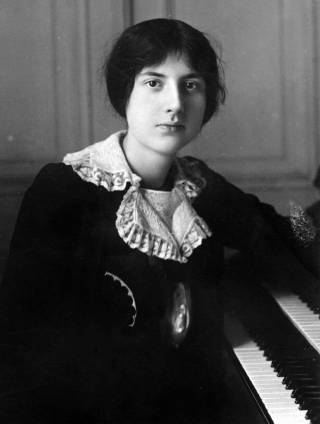A translation workshop, a composition workshop, a research seminar, and a closing concert.
About the project
The aim of this project was to bring French poetry specialists, translators, composers, performers, and musicologists together from UCL and the Royal Academy of Music (RAM), from undergraduate to professorial level, in order to investigate French art song.

Our focus was on the following three French early twentieth-century song cycles: Clairières dans le ciel (1914) by Lili Boulanger (1893-1918), with words by Francis Jammes (1868-1938)); Mirages (1919) by Gabriel Fauré (1845-1924), with words by Renée de Brimont (1880-1943); L’Âme en bourgeon (1937) by Claire Delbos (1906-1959), with words by Cécile Sauvage (1883-1927).
We approached these song cycles experimentally, in a practice-led fashion, through the production of new English singing translations of the French poetry alongside new compositions for new English translations of these poems, together with other related texts. The project brought student composers, singers, pianists, and translators together for workshops to share different skills and perspectives. We believe that such interdisciplinary, collaborative work is vital for the study of song, and we hope that our new translations and compositions will bring new audiences to this repertoire and foster new cross-institutional collaborations.
The project included a research workshop on ‘Music and Early Twentieth-Century French Thought’ (13 October 2023), a translation workshop (20 October 2023), a composition workshop (30 November 2023), and a closing concert: ‘Translating the Mélodie: Women, Poetry and Song in Paris, 1914-40’ (5 June 2024, David Josefowitz Recital Hall, RAM).
The project was inspired in part by recent interest in women poets and composers and by recent experiments in song translation (including Jeremy Sams’s English singing translations of Schubert and Schumann). It was rooted in the academic specialisms of lead applicants Emily Kilpatrick (author of French Art Song (2022); current project on women as participants in and historians of French musical life) and Jennifer Rushworth (author of Proust’s Songbook (2024) and co-editor of Song in the Novel (2024)). It also drew on the expertise of composers and performers at the RAM and translators and translation theorists at UCL (with special mention to Daria Chernysheva, formerly a PhD student at UCL), as well as on the work of collaborators further afield, in particular David Evans (Reader in French at the University of St Andrews).
The intersection of music and translation is increasingly the subject of academic investigations (see, for example, the AHRC network on ‘Translating Music’ (2013-14 and subsequent publications)). The more specific question of song and translation (see especially theoretical articles by Peter Low) is essential for understanding both the history of song and its afterlives, including on the one hand the translation of German Lieder into French in the late nineteenth and early twentieth centuries and, on the other hand, our own diverse engagements with different song traditions in the present day.
This project built on the success of the collaborations from the 21/22 Music Futures stream instigated by Tom Stern (UCL) and Alex Hills (RAM), ‘The Vinteuil Centenary: Music, Memory and Repetition in Proust’. The research workshop was held as part of the UCL & Royal Academy of Music Interdisciplinary Collaboration led by Tom Stern and Alex Hills.
Thank you to all our participants and contributors, and to the RAM and UCL for their support, especially via the ‘Music Futures’ initiative.
About the team
Lead investigators: Prof Emily Kilpatrick (RAM) and Dr Jennifer Rushworth (UCL)
In collaboration with:
Dr Alex Hills (composer and lecturer, RAM)
Prof Geraldine Brodie, Professor of Translation Theory and Theatre Translation (UCL)
Prof Timothy Mathews, Emeritus Professor of French and Comparative Literature (UCL)
Daria Chernysheva (final-year PhD student in Creative Critical Writing, UCL)
 Close
Close

